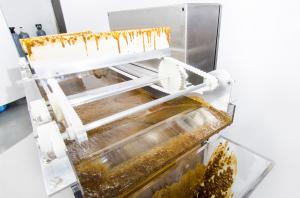A typical fracking well can use up to 10 million gallons of water. Not only is it expensive, it raises concerns about the impact of using that much freshwater, especially in drought-stricken areas.
Texas is one state taking steps to promote the recycling of frac water. “There is a growing demand and understanding of the need to recycle that water rather than disposing of it,” says Bill Charneski, general manager of the Oil and Gas Division of OriginOil in Los Angeles.
The firm recently introduced its CLEAN-FRAC system in Texas where the Railroad Commission, which regulates the fracking industry, says the amount of frac water disposed of in wells has increased from about 4.6 million barrels in 2005 to 3.5 billion barrels in 2011.
Related: Bakken Shale Update: Upbeat Numbers Encourage Investment in Housing, Commercial Sectors
Remove the hurdles
In announcing regulatory changes in March, the commission said it was taking the action, “in hopes that by removing regulatory hurdles, these rule amendments will help foster the recycling efforts by oil and gas operators, who continue to examine ways to reduce freshwater use when hydraulically fracturing wells.”
While the commission says less than 1 percent of water use in Texas goes toward fracking, an Environmental Defense Fund study claims much more localized impact, including:
Related: Product Roundup: Dynamic Dewatering
- The majority of water used for Texas oil and gas development in 2011 was in 13 counties, 10 of which currently have water restrictions in place.
- For 12 counties, oil and gas water use made up at least 25 percent of overall countywide demand in 2011.
- In 15 counties, oil and gas water use is projected to be greater than or equal to 25 percent of the water deficit in those counties in 2020.
- In five counties, 100 percent of the water deficit projected for 2020 can be met by cutting oil and gas water use by half.
Besides saving water, recycling cuts the cost of purchasing freshwater. Disposal wells also charge a fee and there is the cost of transportation on both sides. “Instead of disposing of 1,000 gallons, you may have to dispose of only five gallons,” Charneski says. “It changes the economic picture.”
Economic benefit to remediation
The new Texas regulations eliminate the need for a permit if operators recycle water on their own leases or transfer the water to another operator’s lease for recycling. Charneski says the Texas legislature is also trying to tax every gallon of water put down a disposal well. “There is some environmental pressure to start recycling,” he says. “There are regulatory issues coming from the government, and the technology is moving far enough ahead that there’s actually some economic benefit in remediating the water.”
Related: Editor's Notebook: More Than the Dairy State
OriginOil’s CLEAN-FRAC uses an electro water separation technology, originally developed for algae extraction, to remove 99 percent of the oils and suspended solids in frac water while also eliminating bacteria. Utilizing electrical charges, CLEAN-FRAC raises the oils and solids to the surface so they can be removed. It is the first stage of a multi-stage system and further treatment must be done depending upon how the water is going to be reused.
The technology can be applied to both flowback and produced water. Flowback water is injected during fracking and about 20 percent returns to the surface. Produced water is that which is naturally mixed with oil and pumped out of the ground throughout the lifespan of a well.
“The flowback water comes back out of the well during the first two weeks after a fracking operation,” Charneski says. “The produced water goes on for years. As long as you pump out oil, you’re going to pump out water; typically three barrels of water for every barrel of oil and that ratio goes up as time goes on.” Worldwide, he says, the average ratio is about eight barrels of water per barrel of oil.
- Subscribe
- If you don't want to bring your iPad into the bathroom, we can send you a magazine subscription for free!
“Recycling is a very large trend,” Charneski adds. The Pennsylvania Department of Environmental Protection has asked wastewater treatment plants to stop processing frac water. In Ohio, a proposed bill would ban fracking waste injection wells. “It’s obvious that recycling and remediation of water is going to be a necessity.”
Like this story? Sign up for alerts!






Comments